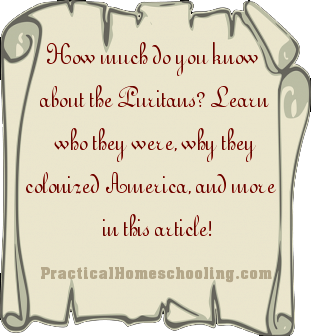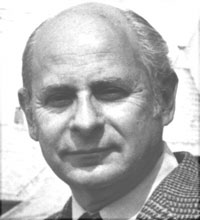Forgotten American History: Puritan Education
By Sam Blumenfeld
Printed in Practical Homeschooling #57, 2004.
 How much do you know about the Puritans? Learn who they were, why they colonized America, and more in this article!
How much do you know about the Puritans? Learn who they were, why they colonized America, and more in this article!

|
 |
 Most Americans are unaware that the main reason why the Pilgrims, a Puritan sect, decided to leave Holland and come to America in 1620 is because they were concerned about the negative influences Dutch culture was having on their children.
Most Americans are unaware that the main reason why the Pilgrims, a Puritan sect, decided to leave Holland and come to America in 1620 is because they were concerned about the negative influences Dutch culture was having on their children.
The Pilgrims had left England because of persecution and found religious freedom in Holland. But their children were in danger of losing their language as well as their religion, and so the decision was made to take themselves to North America where they could build a new Bible commonwealth.
In September of 1620, led by William Bradford and William Brewster, they set sail on the Mayflower, headed toward Virginia. However, two months later they found themselves at Cape Cod. On November 21, before setting foot on dry land, the leaders of the colony drew up the now famous Mayflower Compact, America's first great constitutional document. Its purpose was to create, in God's presence, a covenant among themselves and "frame such just and equal laws, ordinances, acts, constitutions and offices... as shall be thought most meet and convenient for the general good of the colony."
They then discovered a hospitable harbor, which they called Plymouth, and decided to stay. Forty-four settlers died that first winter in the New England wilderness. However, by March 1621 they had built a settlement and chosen William Bradford (1590-1657) to be their Governor.
Ten years later began the mass migration of Puritans from England to Massachusetts seeking the freedom to practice their Calvinist religion and build a Commonwealth based on the Bible. Their charter permitted them to govern themselves, to elect their own governor and legislators. They organized their town churches on the Congregational form as outlined by Calvin in his Institutes. The church was to maintain its ecclesiastical independence from the civil authority and exert a brotherly discipline over its members. Its membership elected its ministers and other officers, and no church dominated any other church. It was this democratic church governance that formed the basis of America's free society.
To the Puritans, the education of children was uppermost in their minds. If a Christian civilization was to flourish in the wilderness, institutions would have to be created to make that happen. Thus it was that in 1636, the Massachusetts legislature, known as the General Court, began laying the groundwork for the colony's education system. Four hundred pounds were appropriated toward the establishment of what was to become Harvard College.
Considering that there were less than 5,000 persons in the entire colony at the time and that the grant was larger than all of the taxes levied on the colony in a single year, it indicated how important education was considered in the infant Bible commonwealth.
Calvin had stressed the importance of an intelligent, learned clergy, knowledgeable in Hebrew, Latin, and Greek, familiar with the writings of the Church Fathers, the Reformers, and the Holy Scripture. He had also stressed the secular and economic benefits of education.
Thus, in 1642, the General Court enacted its first law concerning the education of the colony's children. It ordered:
"That the selectmen of every town, in the several precincts and quarters where they dwell, shall have a vigilant eye over their brethren and neighbors, to see, first, that none of them shall suffer so much barbarism in any of their families, as not to endeavor to teach, by themselves or others, their children and apprentices as much learning as may enable them perfectly to read the English tongue, and knowledge of the capital laws, upon penalty of 20 shillings for each neglect therein; also, that all masters of families do, once a week, at least, catechize their children and servants in the grounds and principles of religion."
Five years later, the General Court enacted a more extensive school law, stating,
"It being one chief project of that old deluder, Satan, to keep man from the knowledge of the Scriptures... and to the end that learning may not be buried in the grave of our forefathers... It is therefore ordered... that every township within this jurisdiction, after the Lord hath increased them to the number of fifty householders, shall then forthwith appoint one within their town to teach all such children as shall resort to him, to write and read... And it is further ordered, that where any town shall increase to the number of one hundred families or householders, they shall set up a grammar school, the masters thereof being able to instruct youths so far as they may be fitted for the university."
Thus, in the short period of only 17 years, the Puritan colonists had already established the foundation of an education system from primary school to the university. Quite a beginning!